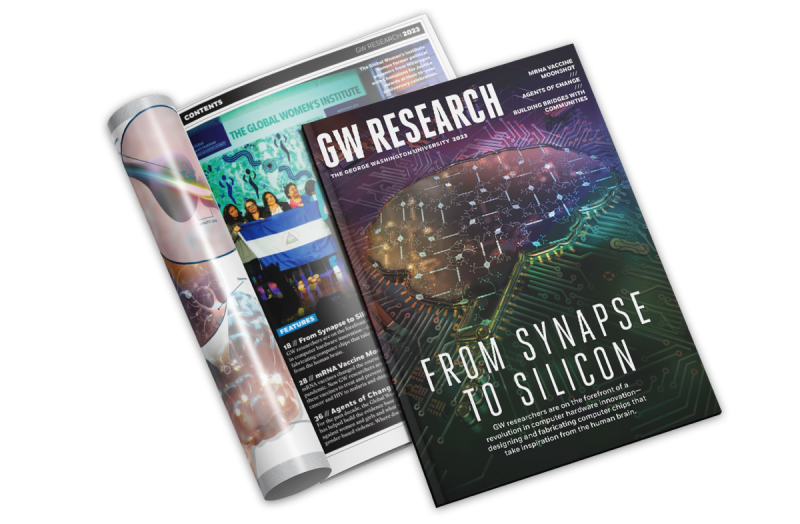Research 2023
RESEARCH
Leading The Fight for Truth
Democratic societies rely on citizens making informed decisions based on facts. Disinformation and misinformation are on the rise globally, threatening the fundamental health of democracy here and abroad. GW’s Institute for Data, Democracy & Politics (IDDP), part of the Columbian College of Arts & Sciences, is combating this digital crisis by convening researchers from disciplines across the university alongside journalists, policymakers, and the public to investigate attacks on truth and develop solutions at the intersection of digital technology, media, and democracy.
IDDP is supported by a $5 million investment from the John S. and James L. Knight Foundation.
Since 2009, GW’s federal research funding has grown by nearly 76 percent, and is #1 in the nation’s capital.
IDDP began at the dawn of the pandemic, delving into misinformation about COVID-19 vaccines and uncovering the organizations behind misleading Facebook advertisements. Now, the institute’s world-class research spans fields from public health to governance and most recently, artificial intelligence. IDDP research regularly explores the complex impact of the social media giant Facebook, recently publishing the first large-scale study of political images on the platform, finding that 23 percent conveyed false information.
In 2023, GW was invited to join the prestigious Association of American Universities (AAU) – recognizing GW as a leader in groundbreaking research, teaching and innovation. GW is one of just 71 AAU member institutions, and we are extremely proud!
With direct links to policymakers around the world, civil society organizations, and leaders at social media companies, IDDP is a trusted partner. IDDP scholars are working alongside changemakers to develop new approaches that address disinformation, hate speech, and online harassment. Recently, the institute’s experts played a leading role in shaping the European Union’s Digital Services Act, and in building platform transparency initiatives in the U.S., U.K., and Canada.
Research Philanthropy in Action
Optimizing Tech
GW Engineering professors, including Gina Adam, Ahmed Louri and others, are accelerating how fast and effectively computer chips can operate. Through collaboration with national research labs like the National Institute of Standards and Technology, and with support from the National Science Foundation, the Air Force and other agencies, GW engineers are designing chips inspired by one of the most energy-efficient and powerful computers in existence: the human brain.
Shaping the Future of AI
GW is co-leading an ambitious, multi-institutional effort to develop new artificial intelligence (AI) technologies that build trust. Funded by a $20 million award from the National Science Foundation (NSF), the NSF Institute for Trustworthy AI in Law & Society (TRAILS) unites specialists in AI, machine learning, systems engineering, social science, law, and public policy to build AI systems that center ethics, human rights, and input from impacted communities.
Pioneering New Standards
Funded by a $1.5 million grant from the McElhattan Foundation, GW Milken Institute School of Public Health Professor David Michaels is developing a framework for government agencies and employers to improve workplace safety policies to reduce injuries and fatalities.
Dive into Discovery
Read more about the latest research and innovation news at GW researchmagazine.gwu.edu




